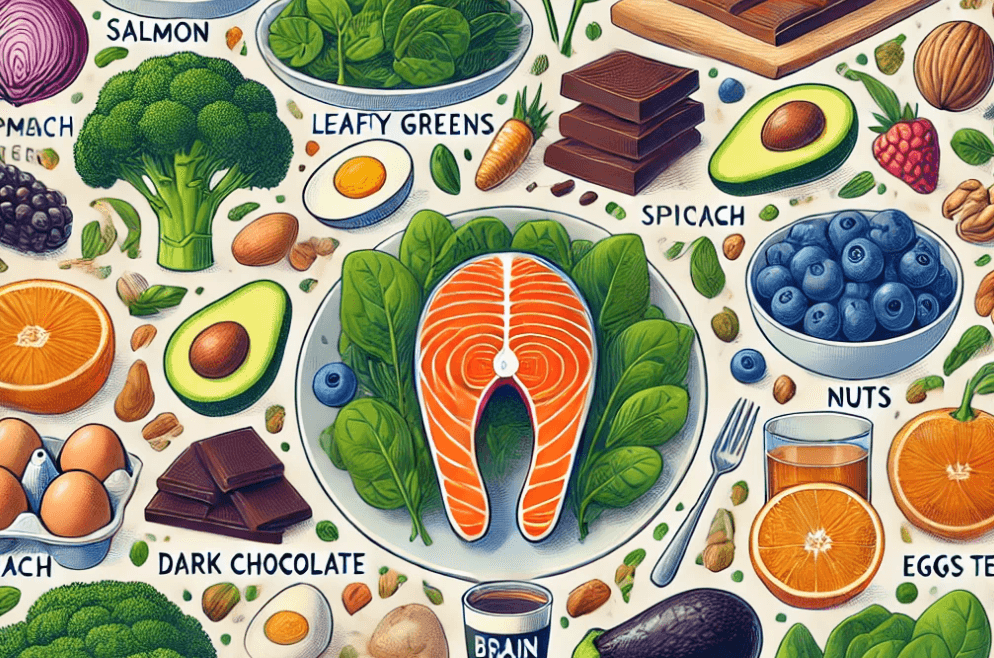Lean proteins, healthy fats, leafy greens, vegetables, fruits, and nuts are all good brain food.
Absolutely! Lean proteins, healthy fats, leafy greens, vegetables, fruits, and nuts are all excellent choices for supporting brain health. Here’s how each of these Brain-boosting foods groups helps:
- Lean Proteins (like chicken, turkey, beans, and tofu): They provide amino acids that are vital for neurotransmitter production, which helps with mood regulation, memory, and cognitive function.
- Healthy Fats (such as those found in avocados, olive oil, and fatty fish): These fats, especially omega-3 fatty acids, are essential for maintaining the integrity of brain cell membranes and supporting overall brain health.
- Leafy Greens (like spinach, kale, and broccoli): Packed with vitamins, minerals, and antioxidants, these help protect the brain from oxidative stress and inflammation while supporting cognitive functions.
- Vegetables (like bell peppers, carrots, and sweet potatoes): Full of antioxidants, vitamins, and fiber, vegetables support brain function and memory, especially those rich in vitamin A, C, and E.
- Fruits (such as berries, oranges, and apples): These provide antioxidants that help reduce oxidative damage and improve brain performance, plus vitamins like C and flavonoids that support cognitive function.
- Nuts (especially walnuts, almonds, and cashews): High in healthy fats, protein, and vitamin E, nuts help protect the brain from cognitive decline and support focus, memory, and learning.
Brain-boosting foods Eating a balanced diet rich in these brain-boosting foods can improve concentration, memory, and overall cognitive performance.
1. Fatty Fish
Fatty fish, such as salmon, mackerel, sardines, and trout, are rich in omega-3 fatty acids, particularly DHA (docosahexaenoic acid), which is crucial for maintaining healthy brain function. About 60% of your brain is made of fat, and a significant portion of that is omega-3. DHA helps improve memory, cognitive function, and even mood regulation. Omega-3s also reduce inflammation and promote healthy blood flow to the brain, which can enhance overall brain health and mental clarity.
2. Blueberries
Blueberries are rich in flavonoids, particularly anthocyanins, which are powerful antioxidants. These antioxidants help reduce oxidative stress in the brain, which occurs when free radicals cause damage to cells. By reducing this damage, blueberries may improve memory, learning abilities, and cognitive function. Regular consumption of blueberries has been linked to improved short-term memory and enhanced focus, especially in older adults.
3. Leafy Greens
Leafy green vegetables like spinach, kale, and broccoli are packed with folate, vitamins K, A, C, and other important nutrients that support brain health. Vitamin K plays a key role in building sphingolipids, a type of fat found in brain cells that helps maintain the structure and function of the brain. Folate (vitamin B9) is essential for brain cell formation, and studies show that adequate levels may reduce the risk of cognitive decline. These vegetables also contain antioxidants that protect against brain aging and support healthy brain function.
4. Nuts and Seeds
Nuts and seeds are rich in healthy fats, protein, and vitamin E, which help support cognitive function. Walnuts in particular stand out because they contain omega-3 fatty acids and have been shown to improve memory and cognitive performance. Almonds, sunflower seeds, and pumpkin seeds are also great sources of magnesium, which supports memory and learning. Vitamin E, found in nuts, helps reduce oxidative stress in the brain and can help protect against cognitive decline as we age.
5. Dark Chocolate
Dark chocolate (with a high cocoa content, 70% or more) is rich in flavonoids, caffeine, and antioxidants. The flavonoids in dark chocolate improve blood flow to the brain, which in turn enhances focus, concentration, and mental clarity. Caffeine provides a mild energy boost and increases alertness. Studies have shown that dark chocolate may also improve memory and support cognitive function over time, particularly in older adults.
6. Turmeric
Curcumin, the active compound in turmeric, is a powerful antioxidant and anti-inflammatory. It can cross the blood-brain barrier and has been shown to increase the production of brain-derived neurotrophic factor (BDNF), a protein that promotes the growth of new brain cells. Curcumin also helps reduce inflammation in the brain, which is linked to conditions like Alzheimer’s and other neurodegenerative diseases. Regular consumption of turmeric may help enhance memory, reduce the risk of cognitive decline, and support overall brain health.
7. Eggs
Eggs are an excellent source of choline, a nutrient that helps produce acetylcholine, a neurotransmitter essential for memory and learning. Inadequate choline intake can impair memory and cognitive function. Additionally, eggs contain B vitamins (like B6 and B12) that help regulate mood and support cognitive function. The protein in eggs also provides the building blocks for brain cells, ensuring the brain functions optimally.
8. Pumpkin Seeds
Pumpkin seeds are rich in zinc, magnesium, and omega-3 fatty acids, all of which are vital for brain health. Zinc plays a key role in neurotransmission, which is how brain cells communicate. It’s also important for memory and the ability to learn. Magnesium helps improve mood and supports cognitive function, while omega-3s support overall brain function, improving focus and memory. The combination of these nutrients makes pumpkin seeds a potent brain-boosting snack.
9. Avocados
Avocados are packed with healthy monounsaturated fats that help maintain healthy blood flow, including blood flow to the brain. The healthy fats found in avocados support the cell membrane structure in brain cells and enhance cognitive function. Additionally, avocados contain a range of antioxidants, including vitamin E, which helps protect the brain from oxidative stress and supports memory and cognitive health.
10. Green Tea
Green tea contains caffeine and L-theanine, which work synergistically to boost cognitive function. Caffeine enhances alertness, focus, and short-term memory, while L-theanine promotes relaxation and reduces stress, helping balance the effects of caffeine. The combination of both can enhance concentration, mental clarity, and overall brain performance. Green tea is also rich in antioxidants, particularly catechins, which help protect brain cells from damage and improve brain function over time.
11. Whole Grains
Whole grains like oats, quinoa, and brown rice provide a steady supply of glucose, which is the brain’s primary source of energy. Unlike refined carbs, which cause blood sugar spikes and crashes, whole grains release glucose slowly into the bloodstream, maintaining steady energy levels for the brain. This helps improve focus and concentration throughout the day. Whole grains also contain B vitamins, which help maintain healthy brain function.
12. Oranges
Oranges are rich in vitamin C, which is a powerful antioxidant that helps protect brain cells from damage caused by free radicals. Vitamin C also plays a role in the production of neurotransmitters, including dopamine, which helps regulate mood, focus, and mental clarity. Regular intake of vitamin C has been linked to better memory, faster information processing, and overall improved brain function.
Summary:
Incorporating a variety of nutrient-rich Brain-boosting foods into your diet, such as fatty fish, leafy greens, nuts, and dark chocolate, can help protect your brain, improve cognitive function, enhance focus and memory, and support long-term brain health. These foods provide essential nutrients like omega-3 fatty acids, antioxidants, vitamins, and minerals that your brain needs to stay sharp and function at its best.






